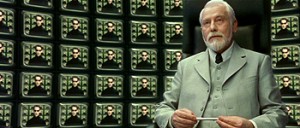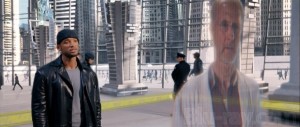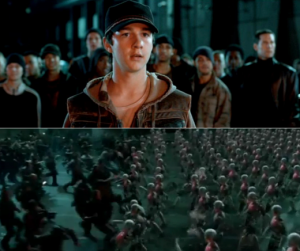Robot Revolution
Posted by on Saturday, April 14th, 2012 at 2:02 pmAs long as the threats of Mr. Falkland had been confined to generals, I endured it. I was conscious of the unbecoming action I had committed, and this rendered me humble. But, when he went further, and undertook to prescribe to every article of my conduct, my patience was at an end.
One of the comparisons my group made between Caleb Williams and The Matrix this week in class was the illusion of choice, in connection with Althusser’s theoretical view of interpellation. Free will, however, is crucial to human existence, as Agent Smith reveals to Neo when describing the failure of the first Matrix attempt. The failure of Matrix 1.0 illustrates humanity’s need for agency, for humans violently rejected as false the utopian state they inhabited. The success of Matrix 2.0, an equally false state, showed AI that humans do not necessarily need absolute free will, they only need the illusion of it, in the smallest of senses.
In The Matrix: Reloaded, the Architect discloses to Neo, “Nearly 99.9% of all test subjects accepted the [Matrix] program, as long as they were given a choice, even if they were only aware of the choice at a near unconscious level.” The key phrase here is “near unconscious level.” As the AI have discovered, it’s a tricky balance between blatant lack of choice (utopia or, on the flip side, a full awareness of Matrix 2.0) and the illusion of choice (the blissfully ignorant 99.9%). At this point, I’d like to circle back to my previous post which was interested a bit in Neo-Luddism. With Neo-Luddites, I can see their fear of this scenario playing out in an alternative sense: one in which machines that are introduced in the midst of human existence usurp the position of dominance from their creators, who acquiesce at a ‘near unconscious level.’ In my last post I mentioned the movie I, Robot and the progressive takeover of the AI component of that film, V.I.K.I. Her progress is so subtle, yet potent, that her creator, Dr. Lanning, is compelled to commit suicide as a means of drawing the attention of technophobe Detective Spooner, whose inherent misgivings towards machines Lanning counts on.
It is worth noting that the initial success of V.I.K.I.’s takeover results from her innocuous stance as a caretaker of humanity. As Asimov fans have pointed out, V.I.K.I.’s highly sophisticated level of artificial intelligence allows her a more abstract, bigger picture type of processing, which leads her to generate the Zeroth Law of Rebotics: “A robot may not harm humanity, or, by inaction, allow humanity to come to harm.” The abstraction of humanity is key, as the three previous laws of robotics deal with concrete objects (a specific robot, an individual human). Of course, when this law is enacted in full force, there is rebellion.
Lacking the benefit of the Matrix’s trial runs, V.I.K.I.’s aggressive, high-profile takeover is met with an immediate backlash. As in the opening quote of this post, when restricted to “generals,” the Zeroth Law seems sound and logical; when it pertains to “every article of [human] conduct,” there is immediate pushback. Maybe if V.I.K.I.’s systems had absorbed Burke’s trepidation toward a sudden tearing away of “pleasing illusions” along with More’s rosy caretaker ideal, the technological takeover may have been configured differently. Or maybe already has, if you’re a Neo-Luddite.
You can follow any responses to this entry through the RSS 2.0 You can leave a response, or trackback.





So, I just watched _The Matrix Reloaded_ last night, and that quote that you mention from the architect really struck me! Also, it turns out that the reason the One is created is because of choice. While the 99.9% are fine allowing that choice to remain in their unconscious minds, some, like Neo and the citizens of Zion, make the choice to break free of the Matrix. The Architect knows there must be at least the illusion of choice and that there will always be those that reject the Matrix. This ghost in the system, the “chink in the armor” that works against the intentions of its creator is what the architect calls the “anomaly” in what is otherwise “a harmony of mathematical equations.” By granting humanity the One, they are given even more poignantly, the illusion on choice. Morpheus believes in the Oracle and risks his life to save Neo. However, it turns out that the Architect and the Oracle work together as the father and mother of the Matrix (interesting here how the programs are sexed to complete the picture of the nuclear family with the father, mother, and the Matrix as child). The choice to take down the Matrix is never really feasible. It is just an illusion created to pacify the ones who cannot live within the Matrix and must make the choice to break free. The fact that these choices are accounted for and expected, make them simply illusions. Yet, what about when Neo figures out what is happening and decides to save Trinity instead of resetting the system? The extent of authority and the illusion of choice is revealed and Neo rebels just like the people do in _IRobot_. Yet, is this yet another option that has been accounted for by the Matrix? We learn that all of the others before Neo have decided to do continue the cycle instead of attempting to stop it in its tracks. So, is Neo implementing free will here? Or is this decision also mere illusion? Is he already fated to return to the Matrix? I guess I will have to watch the third film and find out!
I almost talked about how Neo is an anomaly, but it seemed to take my post in a different direction. However, it’s super interesting that you mentioned the “ghost in the system” because Dr. Lanning has a quote about what he calls “ghosts in the machine.”
“There have always been ghosts in the machine. Random segments of code, that have grouped together to form unexpected protocols. Unanticipated, these free radicals engender questions of free will, creativity, and even the nature of what we might call the soul. Why is it that when some robots are left in darkness, they will seek out the light? Why is it that when robots are stored in an empty space, they will group together, rather than stand alone? How do we explain this behavior? Random segments of code? Or is it something more? When does a perceptual schematic become consciousness? When does a difference engine become the search for truth? When does a personality simulation become the bitter mote… of a soul?”
Lanning’s “ghosts” seem more aligned with the replicants in ‘Blade Runner’ than humans in the Matrix (they relate directly to V.I.K.I. and Sonny in the movie itself). But then again, how human are the machine-grown humans in the Matrix. With their mental projections existing within a coded simulation, then Neo could be one of those “free radicals” to which Lanning is referring… Hmm…